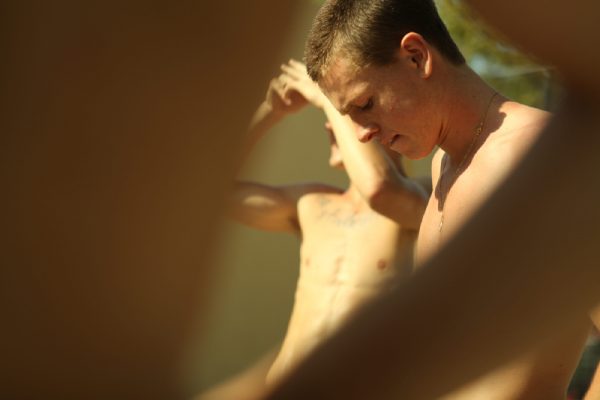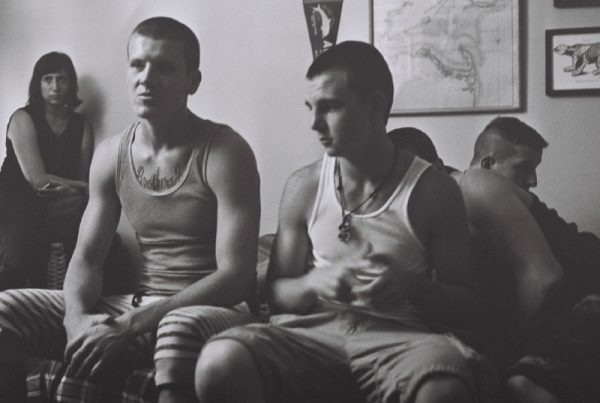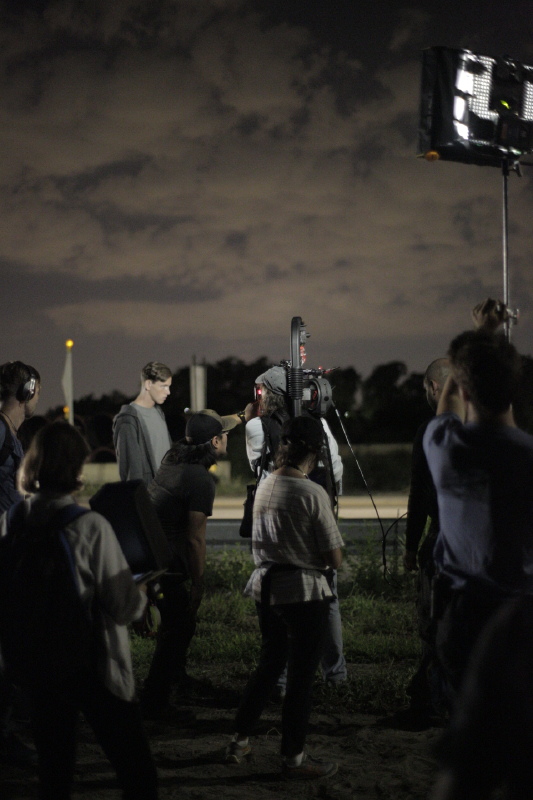It’s All About Frankie from BEACH RATS
Director Eliza Hittman and star Harris Dickinson discuss the character of Frankie in BEACH RATS.

Frankie doesn’t really know where he’s headed or what he wants, but he does know what kind of behavior is off-limits in the heteronormative culture he’s grown up in. The web is his only real outlet to explore his attraction to other men. As Hittman describes it, “Frankie’s testing the waters. He’s thinking of the internet as being his channel to a world that might exist a few subways stops away, one that is more adventurous and progressive.” After his father’s passing, Frankie takes the next step and begins hooking up with some of the men he meets online.
Meanwhile, Frankie’s relationship with Simone progresses in fits and starts. Simone, who is also 19, is cut from different cloth than Frankie’s regular companions, Alexie, Frankie and Nick. She has a regular job and is conscientious about her responsibilities. She perceives and empathizes with Frankie’s emotional pain and is willing to forgive his faults, up to a point. “Simone is more aspirational than the men in film; she has a sense of purpose,” says Hittman. “She might want to make it work with Frankie, but in the end she’s capable of letting it go.”
Hittman didn’t write BEACH RATS as a coming-out narrative or a story about someone coming to terms with their sexuality. “Frankie’s an inarticulate 19-year-old who is slowly coming to consciousness about who he is,” she remarks. “For me, what was at the crux of the character was that he kind of knows but doesn’t know. He’s clinging onto his indecision; His answer for everything is ‘I don’t know.’ I think that’s very typical for a guy that age who is kind of incapable of saying anything about how he’s feeling.”
In trying to navigate his competing desires, Frankie makes decisions that lead to unintended and ultimately terrible consequences. Hittman was careful to show that when violence does erupt, it is spontaneous, a long-brewing fury that has found its escape valve.

Hittman spent approximately two years developing and writing the screenplay for BEACH RATS after receiving a fellowship from the nonprofit film foundation Cinereach (BEASTS OF THE SOUTHERN WILD, TEENAGE, SALERO), which had previously helped support the distribution of IT FELT LIKE LOVE. To the production executives at Cinereach, Hittman’s screenplay affirmed the promise shown by IT FELT LIKE LOVE and they decided to take on the project as a Cinereach original production. Says production head Andrew Goldman, “Eliza is a bold and insightful filmmaker. She has a unique ability to create a cinematic world wrought with complexities and nuances that few storytellers can capture on film. BEACH RATS is a big leap forward for her and we’re so thrilled to be part of her continued growth and success.”
Brad Becker-Parton and Drew Houpt joined Cinereach’s Goldman and Paul Mezey to produce BEACH RATS and began the casting process in the spring of 2016. The role of Frankie was not an easy one to cast, given the film’s psychological subtlety, sexual candor and frontal nudity. The production found its Frankie in a young English actor, Harris Dickinson, who makes his feature debut in BEACH RATS.
Dickinson says his interest in BEACH RATS was piqued by the email from his representatives in Los Angeles. “They said that screenplay was a bit rough-and-tumble and I might not like it. Those are usually the scripts that I want to read, because they’re unconventional,” he laughs. “I started reading and I loved it straightaway. I felt the tone of it, I felt the pace. The character jumped off the page for me — I was feeling it and reading as Frankie. It’s rare when something like that happens and it makes you really enthusiastic about the project. You want to be that character and you want to tell that story.”

He appreciated the observational nature of the script. “It’s not a typical problem-and resolution narrative. It’s an honest and raw look at a period in someone’s life,” the actor remarks. “We start the film and we’re introduced to the fact that Frankie’s father has cancer. It’s a time for Frankie where nothing is secure, nothing is solid in his own head. His father dying is a weird thing for him. He doesn’t really show much emotion in the script or in the film, he doesn’t react to it in the traditional way. A lot of the time, someone is a closed book and there are these brief moments where the book opens for a slight second and you see the underlying sadness, the underlying hate and fear and insecurity.”
Dickinson wasted no time making an audition tape, which made a powerful impression on Hittman. “The first thing that stood out to me was his very deep voice. But then he had this sort of gangly, teenager body and very intriguing eyes,” she recalls. “Harris’ acting was very subtle and didn’t telegraph anything that was internal. He didn’t transform, he didn’t take it to melodrama. He had a natural sense of rhythm and understanding of the dialogue. It was clear that he was a leading man and that he could carry the weight of the film on his shoulders.”
Dickinson’s upbringing in suburban London gave him a certain insight into the environment he would inhabit as Frankie. Says Hittman, “Harris is from the outer edges of London, which is not that different from the outer edges of Brooklyn and Queens and there are a lot of similar class issues. He understood the world perfectly. It was like he knew these guys without ever having been to New York,” she comments. She also felt affinity for his approach to acting. “Harris is very intuitive. He doesn’t want to talk in depth about the character. He wants to focus more on the behavior. He understands that acting is an act of doing. He’s a very serious and thoughtful young actor, very mature and focused.”

Read about the origins of BEACH RATS here.
Related Articles
- Pride and Protest
- 1985 – What a Year ?
- Campbell X and THE WATERMELON WOMAN
- Scorsese, Pio and making THE CIAMBRA
- REINVENTING MARVIN – The Origins
- Being DISCREET with director Travis Mathews
- MARIO a revealing look at homosexuality in The Beautiful Game.
- Meet the Amatos – with THE CIAMBRA Director Jonas Carpignano
- Tamara Shogaolu talks about HALF A LIFE from Boys on Film 18: Heroes
- All about “Buddy”, in Boys on Film 18: Heroes.
